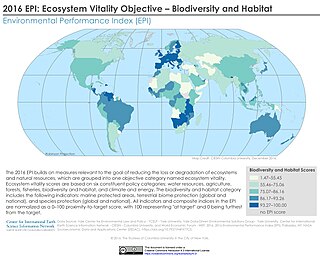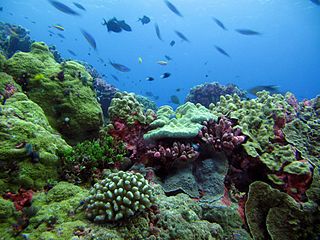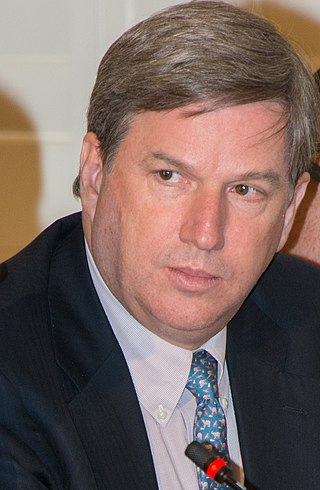
Biodiversity or biological diversity is the variety and variability of life on Earth. Biodiversity is a measure of variation at the genetic, species, and ecosystem level.

Protected areas or conservation areas are locations which receive protection because of their recognized natural, ecological or cultural values. There are several kinds of protected areas, which vary by level of protection depending on the enabling laws of each country or the regulations of the international organizations involved. Generally speaking though, protected areas are understood to be those in which human presence or at least the exploitation of natural resources is limited.

The International Union for Conservation of Nature (IUCN) is an international organization working in the field of nature conservation and sustainable use of natural resources. It is involved in data gathering and analysis, research, field projects, advocacy, and education. IUCN's mission is to "influence, encourage and assist societies throughout the world to conserve nature and to ensure that any use of natural resources is equitable and ecologically sustainable".

The International Union for Conservation of Nature (IUCN) Red List of Threatened Species, also known as the IUCN Red List or Red Data Book, founded in 1964, is the world's most comprehensive inventory of the global conservation status of biological species. It uses a set of precise criteria to evaluate the extinction risk of thousands of species and subspecies. These criteria are relevant to all species and all regions of the world. With its strong scientific base, the IUCN Red List is recognized as the most authoritative guide to the status of biological diversity. A series of Regional Red Lists are produced by countries or organizations, which assess the risk of extinction to species within a political management unit.

Conservation biology is the study of the conservation of nature and of Earth's biodiversity with the aim of protecting species, their habitats, and ecosystems from excessive rates of extinction and the erosion of biotic interactions. It is an interdisciplinary subject drawing on natural and social sciences, and the practice of natural resource management.

The International Council for Game and Wildlife Conservation (CIC) (French: Conseil International de la Chasse et de la Conservation du Gibier, German: Internationaler Rat zur Erhaltung des Wildes und der Jagd) is a politically independent not-for-profit international organisation, aiming to preserve wildlife through the promotion of sustainable use of wildlife resources. The initialism "CIC" comes from the organisation's original French name Conseil International de la Chasse.

The shortnose cisco is a North American freshwater whitefish in the salmon family Salmonidae. One of the members of the broader Coregonus artedi species complex of ciscoes, it is native to the Great Lakes of Canada and the United States. Its population has been declining and it has disappeared from some of its earlier haunts. The last reported population was restricted to Georgian Bay off Lake Huron in Canada. It is thought that declines in the population of this fish may be linked with the arrival of the sea lamprey, in the Great Lakes. The International Union for Conservation of Nature has rated the conservation status of this fish as "critically endangered", and possibly extinct.

The conservation status of a group of organisms indicates whether the group still exists and how likely the group is to become extinct in the near future. Many factors are taken into account when assessing conservation status: not simply the number of individuals remaining, but the overall increase or decrease in the population over time, breeding success rates, and known threats. Various systems of conservation status exist and are in use at international, multi-country, national and local levels as well as for consumer use.

NatureServe, Inc. is a non-profit organization based in Arlington County, Virginia, US, that provides proprietary wildlife conservation-related data, tools, and services to private and government clients, partner organizations, and the public. NatureServe reports being "headquartered in Arlington, Virginia, with regional offices in four U.S. locations and in Canada." In calendar year 2011 they reported having 86 employees, 6 volunteers, and 15 independent officers.

The World Association of Zoos and Aquariums (WAZA) is the "umbrella" organization for the world zoo and aquarium community. Its mission is to provide leadership and support for zoos, aquariums, and partner organizations of the world in animal care and welfare, conservation of biodiversity, environmental education and global sustainability.

The Red List Index (RLI), based on the IUCN Red List of Threatened Species, is an indicator of the changing state of global biodiversity. It defines the conservation status of major species groups, and measures trends in extinction risk over time. By conducting conservation assessments at regular intervals, changes in the threat status of species in a taxonomic group can be used to monitor trends in extinction risk. RLIs have been calculated for birds and amphibians, using changes in threat status for species in each of the groups.

Ian Richard Swingland is a British conservationist, convicted in 2017 of conspiring to commit fraud by false representation. He founded DICE at the University of Kent in 1989, recognised as one of the first interdisciplinary research and postgraduate training institutes in the world concentrating on biodiversity, communities and sustainable development. While at DICE he served as director and was elected to the first chair in Conservation Biology in the United Kingdom.

The World Database on Protected Areas (WDPA) is the largest assembly of data on the world's terrestrial and marine protected areas, containing more than 260,000 protected areas as of August 2020, with records covering 245 countries and territories throughout the world. The WDPA is a joint venture between the United Nations Environment Programme World Conservation Monitoring Centre and the International Union for Conservation of Nature World Commission on Protected Areas.

Cristián Samper is a Colombian-American tropical biologist specializing in conservation biology and environmental policy. He is the Managing Director and Leader of Nature Solutions at the Bezos Earth Fund. He served as President and CEO of WCS from 2012 to 2022. He was the Director of the Smithsonian Institution's National Museum of Natural History, the world's largest natural history collection, from 2003 to 2012, and served as acting Secretary of the Smithsonian from 2007 to 2008, the first Latin American to hold the position. In April 2015, Dr. Samper was inducted into the American Academy of Arts and Sciences.
Centres of Plant Diversity (CPD) was established in 1998 as a joint classification initiative between the World Wildlife Fund (WWF) and the International Union for Conservation of Nature intended to identify the areas in the world that are of the highest conservation value in terms of protecting the highest number of plant species. In 1998 there were 234 Centers of Plant Diversity registered across the globe, each bearing a rich diversity of endemic plant species that are of great value to humans and their native ecosystems that tend to be under unique edaphic conditions. Many CPD's are enlisted as a part of a legally protected area though they do not necessarily have legal protection automatically assigned to them. A CPD Is recognised primarily as a portion of a greater protected area that holds particularly significant biodiversity, likely to have a high number of irreplaceable plant species which are of high vulnerability.
Tundi Agardy is a marine conservationist and the founder of Sound Seas – a Washington DC-based group specializing in working at the nexus of marine science and policy in order to safeguard ocean life.

This is a list of topics in biodiversity.

Inger Andersen is a Danish economist and environmentalist. In February 2019, she was appointed as the Executive Director of the United Nations Environment Programme.

Ravindra Kumar Sinha is a Padma Shri awarded Indian biologist and environmentalist. Currently, he is Vice-Chancellor of Shri Mata Vaishno Devi University and formerly of Nalanda Open University. Previously he was the Head of the Department of Zoology at Patna University, and is a pioneer researcher and wildlife conservationist, famous for his efforts for the conservation of Gangetic Dolphins, he is popularly known as the "Dolphin Man of India".
















